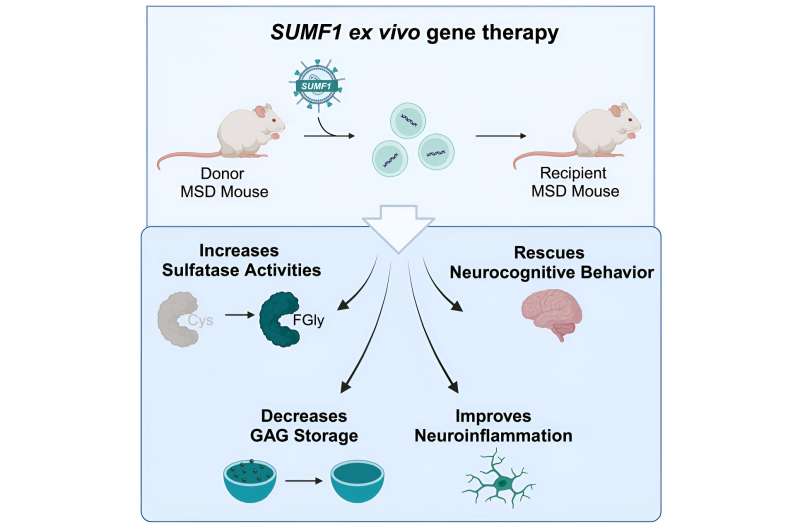This article has been reviewed according to Science X's editorial process and policies. Editors have highlighted the following attributes while ensuring the content's credibility:
fact-checked
peer-reviewed publication
trusted source
proofread
Researchers report encouraging first evidence of effective new gene therapy to treat multiple sulfatase deficiency

Researchers from Children's Hospital of Philadelphia (CHOP) have tested a preclinical model for an experimental gene therapy designed to treat multiple sulfatase deficiency (MSD), a disorder that affects the brain, lungs, skin, and skeleton with no currently approved treatments. The findings demonstrated several improvements in outcomes, paving the way for future translation into clinical trials. The findings are published in the journal Molecular Therapy.
MSD is a lysosomal storage disorder caused by pathogenic variants of the SUMF1 gene. As a result, cells in the body are unable to activate the sulfatases, an important group of enzymes required to break down different storage materials. When these cells are unable to break down these substances, patients can experience a variety of devastating symptoms, with neurologic deterioration being the most severe symptom that patients with MSD face.
Researchers from CHOP have taken several key approaches toward understanding MSD and developing potential therapies to treat it. Currently, an international group of clinical, research and advocacy collaborators is working together to understand the natural history of MSD from mild to severe cases. The researchers also identified biomarkers associated with MSD, which could be used in a number of different future clinical trials of novel therapies.
"Since MSD is a multi-systemic disorder, we are exploring different approaches to gene therapy delivery, and hematopoietic stem cell transplant appeared to be a potentially effective way of directing gene therapy toward many different organs," said senior study author Rebecca Ahrens-Nicklas, MD, Ph.D., an attending physician with the Metabolic Disease Program and the Division of Human Genetics at CHOP.
"A patient's own bone marrow cells can be transduced with the lentiviral vector to introduce a working copy of the gene that causes MSD. Then, the patient receives the corrected cells back via stem cell transplant, which is an approach that has proven to have worked for related disorders like metachromatic leukodystrophy."
In this study, researchers used a preclinical mouse model of MSD and tested this gene therapy approach on patient-derived stem cells and the animal model. In patient-derived cells, the vector improved protein expression, sulfatase activities, and glyosaminoglycan accumulation, which is important for a wide variety of key cell functions.
In the mouse model, the gene therapy approach rescued biochemical deficits, including sulfatase activity and glycosaminoglycan accumulation that can lead to improper cell function, in MSD-affected organs post-symptom onset. Additionally, the mice demonstrated improved neuroinflammation and neurocognitive function.
"This is a really important first step in the design and provides proof of concept that an ex vivo gene therapy could help patients with MSD," Ahrens-Nicklas said. "With multiple gene therapy candidates for this disease, we are optimizing the likelihood of really being able to help families."
More information: Vi Pham et al, Hematopoietic stem cell gene therapy improves outcomes in a clinically relevant mouse model of multiple sulfatase deficiency, Molecular Therapy (2024). DOI: 10.1016/j.ymthe.2024.08.015

















